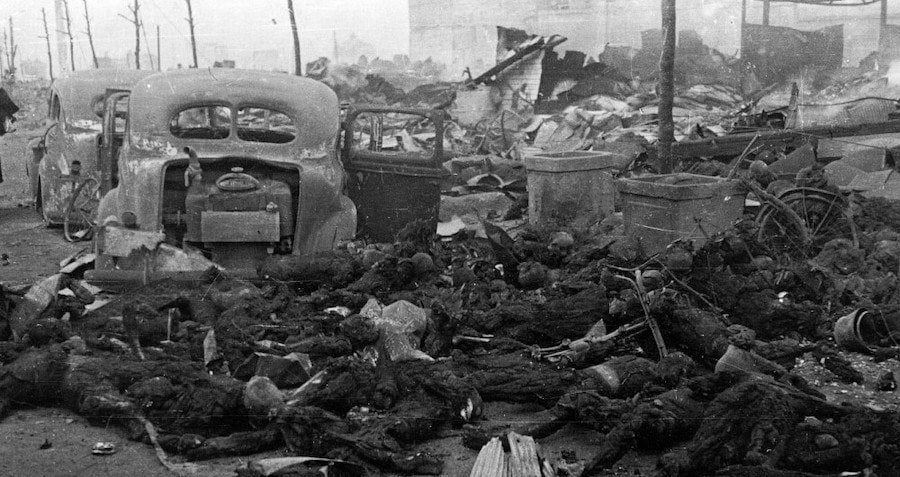More tedious whining. Japan was free to surrender any time they wanted to."General Dwight Eisenhower, in his memoirs, recalled a visit from Secretary of War Henry Stimson in late July 1945: “I voiced to him my grave misgivings, first on the basis of my belief that Japan was already defeated and that dropping the bomb was completely unnecessary, and secondly because I thought that our country should avoid shocking world opinion by the use of a weapon whose employment was, I thought, no longer mandatory as a measure to save American lives. It was my belief that Japan was, at that very moment, seeking some way to surrender with a minimum loss of ‘face.’” Eisenhower reiterated the point years later in a Newsweek interview in 1963, saying that “the Japanese were ready to surrender and it wasn’t necessary to hit them with that awful thing.”1
It was their choice and their fault that they chose not to do so.
And yet Japan chose to not surrender.That the Japanese were on the verge of defeat was made clear to the president in a top-secret memorandum from Secretary of War Henry Stimson on July 2, 1945. Stimson noted that Japan “has no allies,” its “navy is nearly destroyed,” she is vulnerable to an economic blockade depriving her “of sufficient food and supplies for her population,” she is “terribly vulnerable to our concentrated air attack upon her crowded cities, industrial, and food resources,” she “has against her not only the Anglo-American forces but the rising forces of China and the ominous threat of Russia,” and the United States has “inexhaustible and untouched industrial resources to bring to bear against her diminishing potential."
Turned out to be a bad choice. Dumb move on their part.
Are you quoting Gar Alperovitz there?"This was not why Hiroshima was chosen. Rather, the city was selected because it was “the largest untouched target not on the 21st Bomber Command priority list,” according to the administration’s Target Committee.20 Hiroshima, in other words, did not have enough military production to justify an earlier conventional attack (as compared to other cities on the priority list), and the effects of the bomb had to be uncontaminated from previous bombings in order to properly assess their damage."
Whoever you are quoting is pretty disingenuous, because Hiroshima was selected as an atomic target early in the bombing campaign when only a handful of Japanese cities had been destroyed.
They are the ones who waited until August 10 before deciding to surrender."Indeed, Japan had put out peace feelers. As reported in the New York Times on July 26, 1945, “The Tokyo Radio, in an English-language broadcast to North America, has urged that the United States adopt a more lenient attitude toward Japan with regard to peace.” The broadcast quoted an ancient Aesop Fable in which a powerful wind could not force a man to give up his coat, but a gentle warming sun succeeded in doing so.25
Japan’s appeal fell on deaf ears in Washington."
Fake news. Never happened.
Fake news. Never happened."Two days before the late President Roosevelt left the last week in January for the Yalta conference with Prime Minister Churchill and Marshal Stalin he received a Japanese offer identical with the terms subsequently concluded by his successor, Harry S. Truman."
More tedious whining. Japan was still refusing to surrender so we had every right to continue attacking them.
The Bomb Was Not Necessary
With the sixty-fifth anniversary of the dropping of the atomic bomb almost upon us, there is undoubtedly going to be a flood of commentary on the wisdom of its use by the United States during World War II. The justified scolding of Charles Pellegrino and his The Last Train From Hiroshima...historynewsnetwork.org


